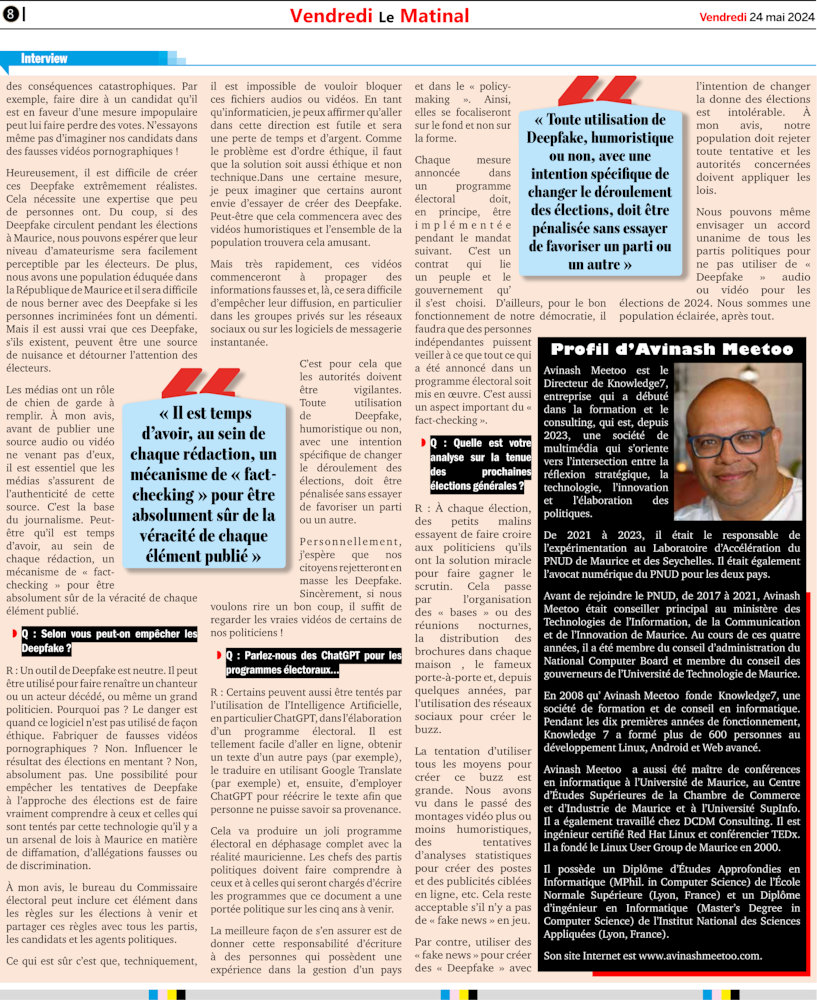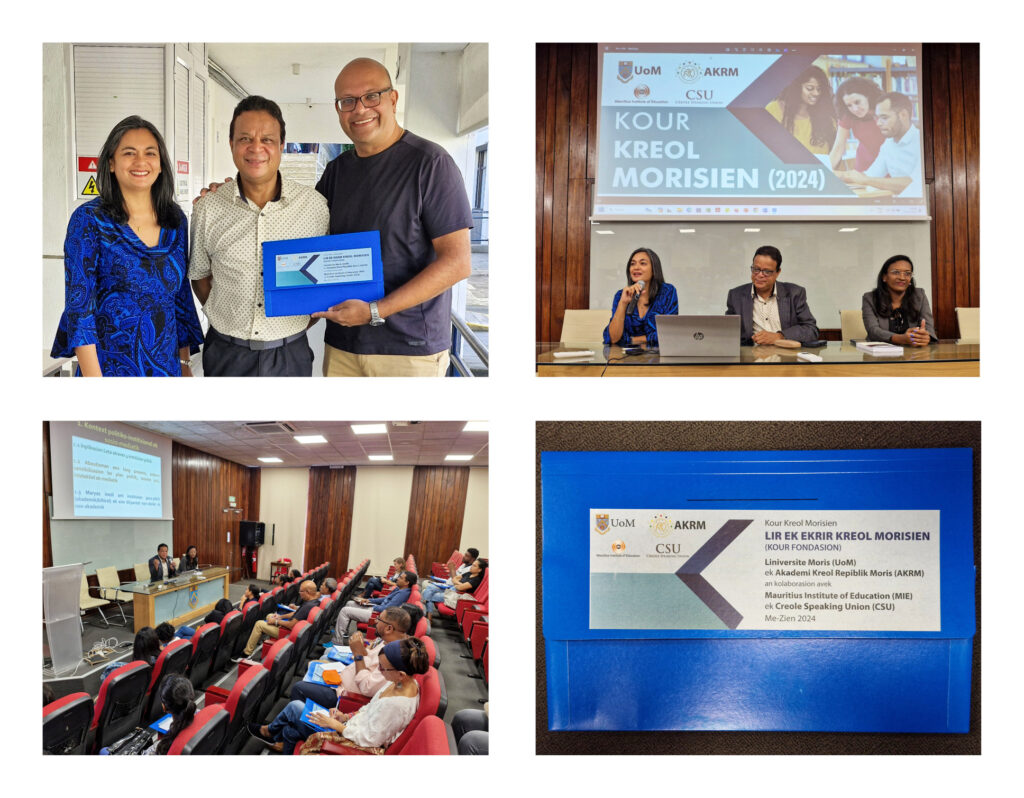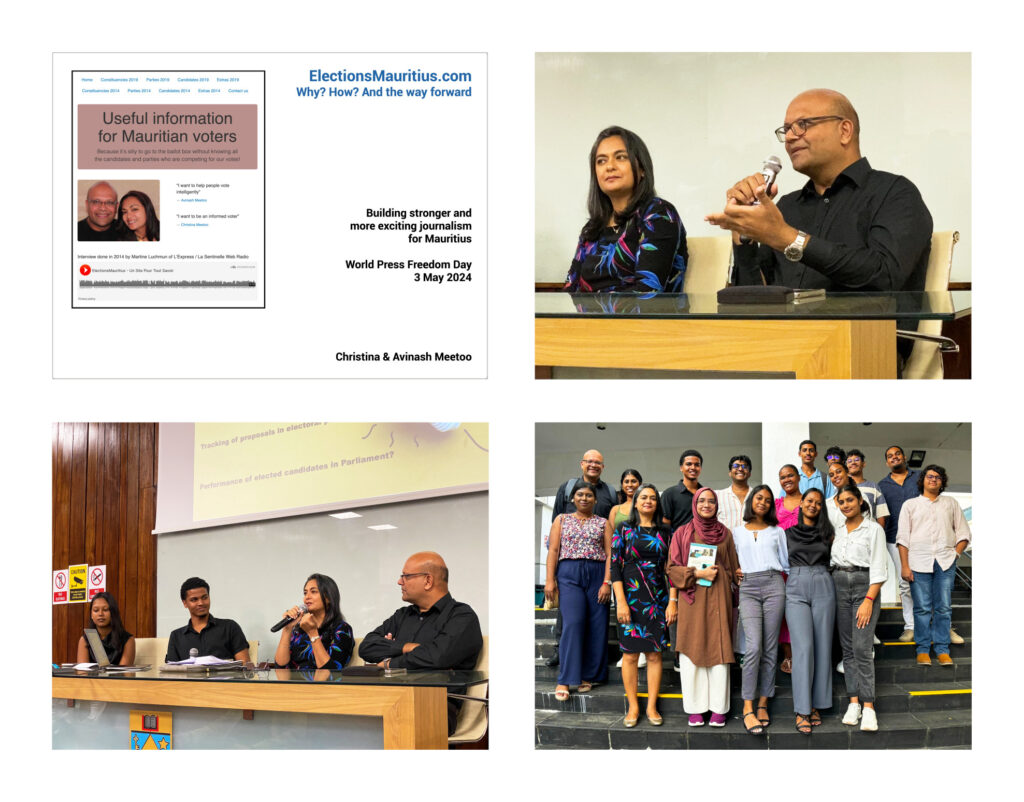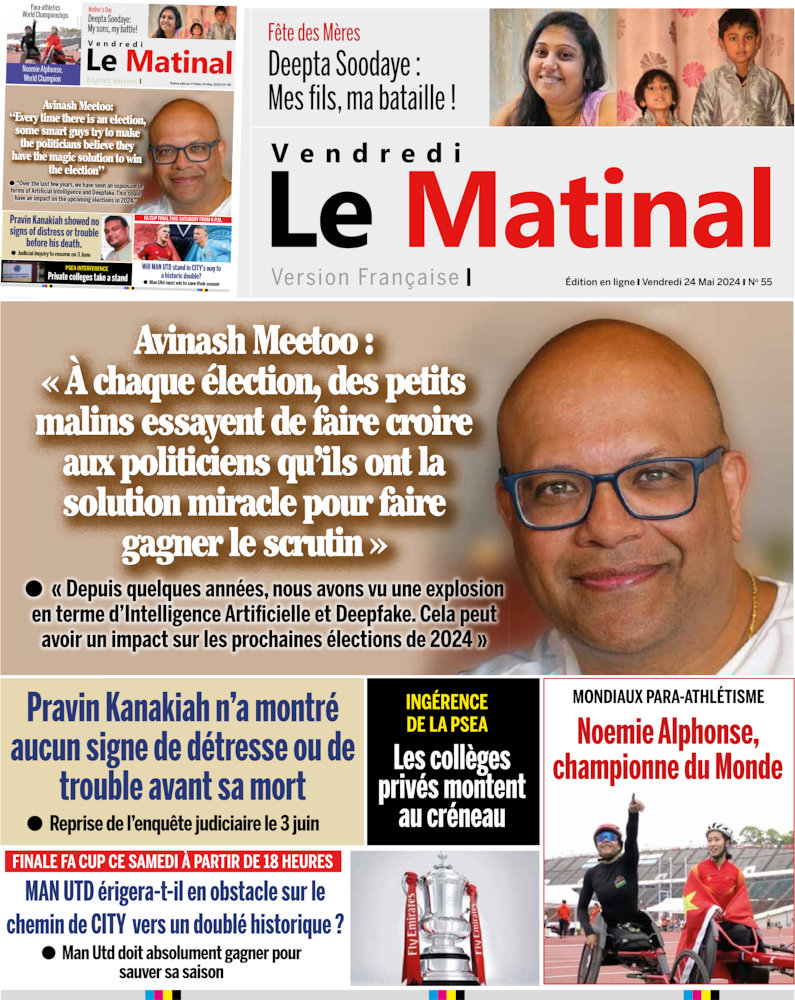
Voici mon interview paru dans Le Matinal du Vendredi 24 Mai 2024. Propos recueillis par Sanjay BIJLOLL.
Les prochaines élections générales s’approchent à grands pas. Dans cette optique, Vendredi Le Matinal a jugé utile de solliciter les impressions de l’informaticien, Avinash Meetoo, direteur de Knowledge 7. Il nous explique l’impact des technologies utilisées par des politiciens, à l’instar de l’ Intelligence Artificiel et de Deepfake pour truquer les élections avec la complicité des professionnels dans le domaine .
Quel est votre objectif d’avoir créé votre ElectionsMauritius.com ?
Les élections approchent à grands pas et les Mauriciens iront aux urnes pour choisir leurs députés au Parlement. Pendant cinq ans, ces députés auront à débattre des lois du pays et auront la responsabilité de s’assurer qu’elles soient conformes aux souhaits des citoyens. Ils auront aussi comme deuxième mission de s’assurer que les circonscriptions qui les ont choisis se développent et tout problème identifié soit rapidement résolu.
Pour cela, il est impératif que les électeurs choisissent les candidats qui possèdent la capacité et les compétences pour travailler dans l’intérêt collectif.
Pour cela il est impératif que les mandants connaissent les candidats. Pendant les élections, nous aurons plein de meetings, de réunions privées, des brochures à nos boîtes aux lettres ainsi que le programme électoral des partis politiques.
Nous aurons aussi la possibilité d’avoir des interviews dans nos journaux et des interventions à la radio. Naturellement, et cela forme partie de notre folklore politique, nous aurons les émissions politiques à la MBC . En général, les candidats des partis dits “grands” seront bien connus du public.
Malheureusement, cela ne sera pas forcément vrai pour les candidats des “petits” partis ou les indépendants. Ces personnes auront bien du mal à se faire connaître.
D’ailleurs, c’est pour cette raison que dix ans de cela, pour les élections de 2014, mon épouse, Christina Chan-Meetoo, et moi avions créé le site ElectionsMauritius. com. Notre objectif était de donner des informations utiles aux électeurs mauriciens parce que nous nous étions rendus compte que c’est idiot d’aller aux urnes sans connaître tous les candidats et partis qui se disputent nos votes !
Nous voulions informer et former les électeurs à voter en toute connaissance de cause. Comme il est souvent difficile d’obtenir des informations fiables et utiles sur les candidats et les partis, on découvre souvent la liste complète des candidats le jour même des élections ! Sur ElectionsMauritius.com, chaque candidat dispose de sa propre page avec des informations détaillées. Le site permet aussi d’utiliser le moteur de recherche de Google pour obtenir, pour chaque candidat, si disponible, sa page Web, ses photos et son profil sur les réseaux sociaux… Pour 2024, ElectionsMauritius. com va faire peau neuve et proposera de nouvelles fonctionnalités.
Est-ce que l’Intelligence Artificielle et le Deepfake représentent un danger réel pour la tenue des prochaines élections générales ?
Depuis quelques années, nous avons vu une explosion en terme d’Intelligence Artificielle et cela peut avoir un impact sur la tenue des prochaines élections de 2024. Nous sommes tous plus ou moins utilisateurs de technologies comme ChatGPT qui se décrit comme un outil qui peut être utilisé pour une variété de tâches de traitement du langage naturel, telles que la traduction linguistique, la réponse à des questions et le résumé de texte. Il y a fort à parier que beaucoup auront recours à ChatGPT pour les aider à créer des postes sur les réseaux sociaux.
Mais l’Intelligence Artificielle permet aussi la création de Deepfake. C’est une technique de synthèse multimédia qui peut servir, par exemple, à changer le visage d’une personne sur une vidéo ou reproduire la voix d’une personne pour la faire dire des choses qu ‘elle n’a jamais dites. Bien que cette technique nous ait permis de revoir des artistes disparus, elle peut aussi être utilisée pour créer des informations fausses et des canulars malveillants.
Pour ce faire, on peut utiliser des logiciels qui sont facilement accessibles sur Internet mais il y a un énorme problème en terme d’éthique. Bien que la technologie permette à n’importe quel créatif de s’amuser pendant un moment sans nuire à personne sur la vidéo, les Deepfake sont surtout devenus populaires parce qu’ils peuvent aider à générer de fausses vidéos pornographiques extrêmement réalistes avec des visages d’actrices et d’acteurs célèbres.
Dans le cadre d’une élection où l’idée fondamentale est que les citoyens puissent choisir les meilleurs candidats en fonction de ce qu’ils ou elles ont réellement dit ou fait, un Deepfake réaliste peut avoir des conséquences catastrophiques. Par exemple, faire dire à un candidat qu’il est en faveur d’une mesure impopulaire peut lui faire perdre des votes. N’essayons même pas d’imaginer nos candidats dans des fausses vidéos pornographiques !
Heureusement, il est difficile de créer ces Deepfake extrêmement réalistes. Cela nécessite une expertise que peu de personnes ont. Du coup, si des Deepfake circulent pendant les élections à Maurice, nous pouvons espérer que leur niveau d’amateurisme sera facilement perceptible par les électeurs. De plus, nous avons une population éduquée dans la République de Maurice et il sera difficile de nous berner avec des Deepfake si les personnes incriminées font un démenti. Mais il est aussi vrai que ces Deepfake, s’ils existent, peuvent être une source de nuisance et détourner l’attention des électeurs.
Les médias ont un rôle de chien de garde à remplir. À mon avis, avant de publier une source audio ou vidéo ne venant pas d’eux, il est essentiel que les médias s’assurent de l’authenticité de cette source. C’est la base du journalisme. Peut-être qu’il est temps d’avoir, au sein de chaque rédaction, un mécanisme de « fact-checking » pour être absolument sûr de la véracité de chaque élément publié.
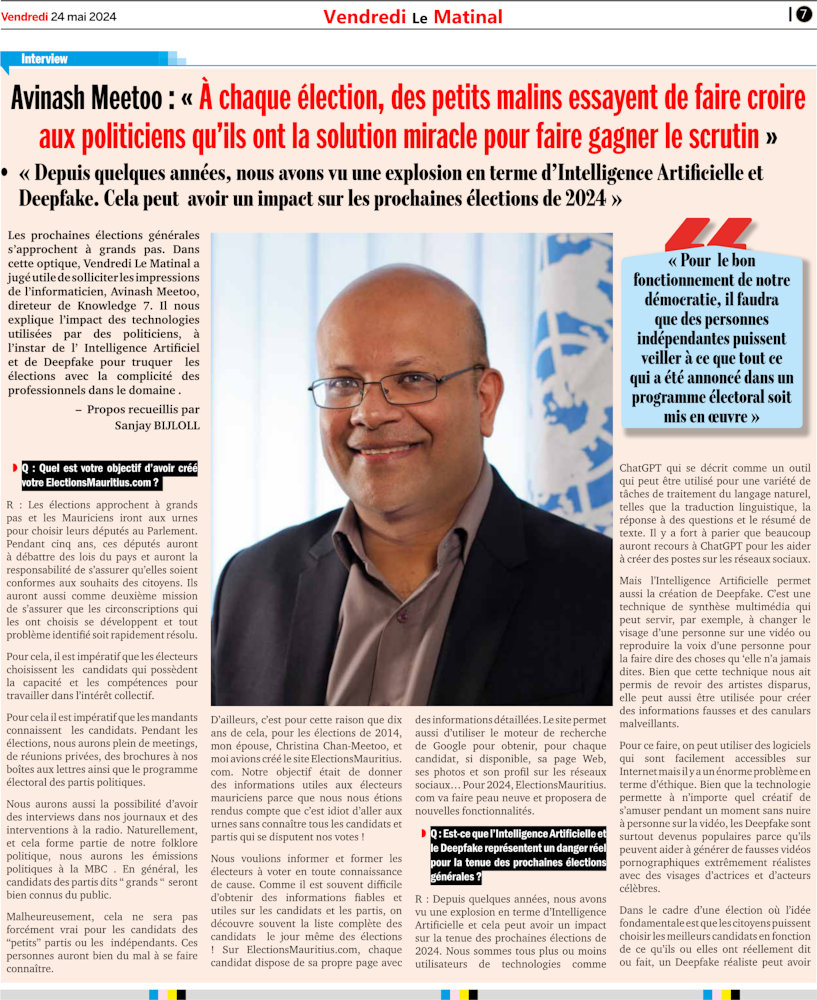
Selon vous peut-on empêcher les Deepfake ?
Un outil de Deepfake est neutre. Il peut être utilisé pour faire renaître un chanteur ou un acteur décédé, ou même un grand politicien. Pourquoi pas ? Le danger est quand ce logiciel n’est pas utilisé de façon éthique. Fabriquer de fausses vidéos pornographiques ? Non. Influencer le résultat des élections en mentant ? Non, absolument pas. Une possibilité pour empêcher les tentatives de Deepfake à l’approche des élections est de faire vraiment comprendre à ceux et celles qui sont tentés par cette technologie qu’il y a un arsenal de lois à Maurice en matière de diffamation, d’allégations fausses ou de discrimination.
À mon avis, le bureau du Commissaire électoral peut inclure cet élément dans les règles sur les élections à venir et partager ces règles avec tous les partis, les candidats et les agents politiques.
Ce qui est sûr c’est que, techniquement, il est impossible de vouloir bloquer ces fichiers audios ou vidéos. En tant qu’informaticien, je peux affirmer qu’aller dans cette direction est futile et sera une perte de temps et d’argent. Comme le problème est d’ordre éthique, il faut que la solution soit aussi éthique et non technique.Dans une certaine mesure, je peux imaginer que certains auront envie d’essayer de créer des Deepfake. Peut-être que cela commencera avec des vidéos humoristiques et l’ensemble de la population trouvera cela amusant.
Mais très rapidement, ces vidéos commenceront à propager des informations fausses et, là, ce sera difficile d’empêcher leur diffusion, en particulier dans les groupes privés sur les réseaux sociaux ou sur les logiciels de messagerie instantanée.
C’est pour cela que les autorités doivent être vigilantes. Toute utilisation de Deepfake, humoristique ou non, avec une intention spécifique de changer le déroulement des élections, doit être pénalisée sans essayer de favoriser un parti ou un autre.
Personnellement, j’espère que nos citoyens rejetteront en masse les Deepfake. Sincèrement, si nous voulons rire un bon coup, il suffit de regarder les vraies vidéos de certains de nos politiciens !
Parlez-nous des ChatGPT pour les programmes électoraux…
Certains peuvent aussi être tentés par l’utilisation de l’Intelligence Artificielle, en particulier ChatGPT, dans l’élaboration d’un programme électoral. Il est tellement facile d’aller en ligne, obtenir un texte d’un autre pays (par exemple), le traduire en utilisant Google Translate (par exemple) et, ensuite, d’employer ChatGPT pour réécrire le texte afin que personne ne puisse savoir sa provenance.
Cela va produire un joli programme électoral en déphasage complet avec la réalité mauricienne. Les chefs des partis politiques doivent faire comprendre à ceux et à celles qui seront chargés d’écrire les programmes que ce document a une portée politique sur les cinq ans à venir.
La meilleure façon de s’en assurer est de donner cette responsabilité d’écriture à des personnes qui possèdent une expérience dans la gestion d’un pays et dans le « policy- making ». Ainsi, elles se focaliseront sur le fond et non sur la forme.
Chaque mesure annoncée dans un programme électoral doit, en principe, être implémentée pendant le mandat suivant. C’est un contrat qui lie un peuple et le gouvernement qu’il s’est choisi. D’ailleurs, pour le bon fonctionnement de notre démocratie, il faudra que des personnes indépendantes puissent veiller à ce que tout ce qui a été annoncé dans un programme électoral soit mis en œuvre. C’est aussi un aspect important du « fact-checking ».
Quelle est votre analyse sur la tenue des prochaines élections générales ?
À chaque élection, des petits malins essayent de faire croire aux politiciens qu’ils ont la solution miracle pour faire gagner le scrutin. Cela passe par l’organisation des « bases » ou des réunions nocturnes, la distribution des brochures dans chaque maison , le fameux porte-à-porte et, depuis quelques années, par l’utilisation des réseaux sociaux pour créer le buzz.
La tentation d’utiliser tous les moyens pour créer ce buzz est grande. Nous avons vu dans le passé des montages vidéo plus ou moins humoristiques, des tentatives d’analyses statistiques pour créer des postes et des publicités ciblées en ligne, etc. Cela reste acceptable s’il n’y a pas de « fake news » en jeu.
Par contre, utiliser des « fake news » pour créer des « Deepfake » avec l’intention de changer la donne des élections est intolérable. À mon avis, notre population doit rejeter toute tentative et les autorités concernées doivent appliquer les lois.
Nous pouvons même envisager un accord unanime de tous les partis politiques pour ne pas utiliser de « Deepfake » audio ou vidéo pour les élections de 2024. Nous sommes une population éclairée, après tout.
